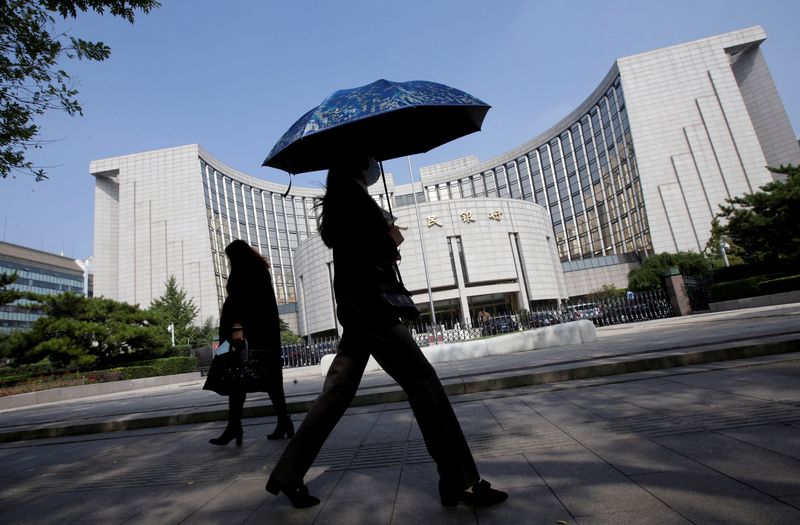By Kevin Yao
BEIJING (Reuters) - Chinese policymakers will likely step up measures to at least help the economy meet an increasingly challenging growth target for 2024, analysts and policy advisers say, with a sharper focus on boosting demand to fight persistent deflationary pressures.
Official data showed the world's second-largest economy slowed broadly in August, fuelling expectations for more stimulus. President Xi Jinping recently urged authorities to strive to meet the country's annual economic goals, signalling Beijing remains committed to hitting its around 5% GDP growth target.
Policymakers are navigating a complicated economic landscape, with China's reliance on infrastructure spending to drive growth exacerbating debt risks. Excessive domestic investment amid weak demand has also fuelled deflationary pressures, which have already pushed down prices and forced companies to reduce wages or fire workers to cut costs.
"We need to strengthen fiscal policy, which is more effective at addressing deflation, while adjusting monetary policy further to keep it accommodative," a policy adviser said on condition of anonymity.
The Federal Reserve's interest rate cut on Wednesday, which began the U.S. easing cycle, will create more space for the People's Bank of China (PBOC) to lower interest rates and banks' reserve requirement ratio. The PBOC may also slash interest rates on existing mortgages to help homeowners, analysts said.
China could additionally step up its spending. Local governments have been quickening bond issuance to help fund the construction of major projects, alongside increased debt issuance by the central government to support key strategic sectors.
While policymakers may count on a combination of fiscal stimulus and monetary easing to spur growth, a key meeting of the ruling Communist Party in July reaffirmed a stronger focus on the supply side. That suggests forceful measures to tackle weak consumer demand and deepening deflation risks are unlikely in the near term.
"They (policymakers) will step up efforts as they are unwilling to accept lower growth," said Xu Hongcai, deputy director of the economic policy commission at the state-backed China Association of Policy Science.
"But any forceful stimulus looks unlikely."
Over recent years China has been relying on increased spending on infrastructure and manufacturing to support growth, with the central bank steadily lowering borrowing costs.
GROWTH TARGET AT RISK
China's roughly 5% growth target for 2024 allows for some flexibility. However, faltering growth in recent months has prompted several global brokerages to lower their forecasts below that target.
China, which has rarely failed to reach its growth target, last missed its growth goal in 2022, when the pandemic knocked growth to 3% in 2022, sharply lower than the target of around 5.5%.
"More stimulus is urgently needed," said Xing Zhaopeng, ANZ's senior China strategist. "The policy thinking appears to be shifting from supply to demand. There will be a significant stimulus on household demand and public consumption."
Morgan Stanley analysts predict China will use fiscal expansion to increase spending on social security, such as healthcare, education, and public housing, which would help reduce precautionary savings and boost consumption.
ANZ has pencilled in a stimulus package - which includes benefits from expected mortgage rate cuts and efforts to spur housing and consumer goods trade-ins - that could generate 0.2% GDP. But it still maintains its 2024 growth forecast of 4.9%.
Earlier this month, former central bank governor Yi Gang made unusually strong comments urging action against deflationary pressure.
China's GDP deflator, the broadest measure of prices across goods and services, has fallen for five consecutive quarters — the longest deflationary streak since 1999.
The measure is widely expected to stay negative for a sixth quarter in July-September, with producer price deflation deepening and consumer prices staying sluggish.

Any sharp resurgence in consumption remains doubtful, amid job and income insecurity.
"To lift the economy out of the downward deflationary spiral, a lot more is needed, particularly from the fiscal side to ease local government deleveraging pressure,” analysts at Societe Generale (OTC:SCGLY) said in a note.